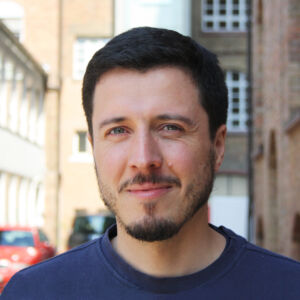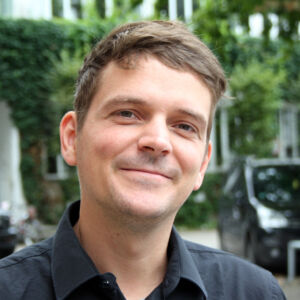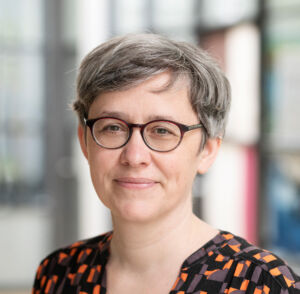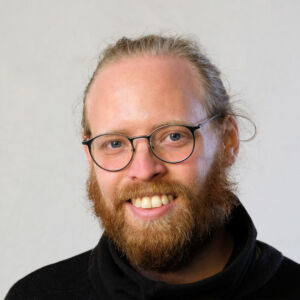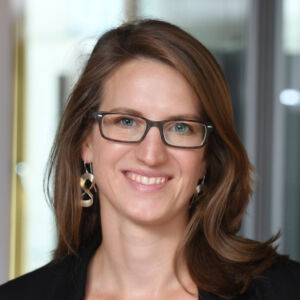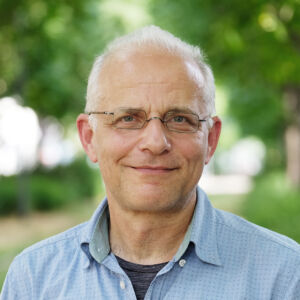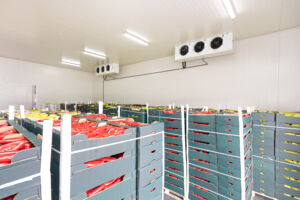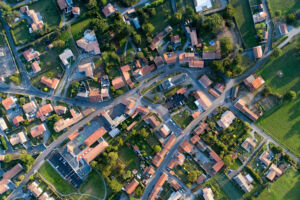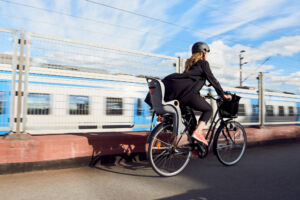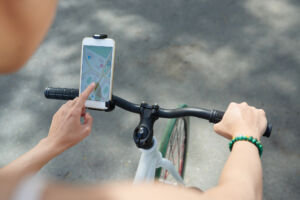

Sustainable Society
In the Research Unit “Sustainable Society”, we analyze how changes in the areas of housing, transportation, recreation and nutrition are promoted or hindered. We investigate blockages caused by different needs, conflicts of interest and unequal power relations. We develop concepts and experimental spaces to identify unsustainable practices and to test new, sustainable approaches.
Our research focuses on three research strands:
Transformation of settlement areas for improved quality of life, climate adaptation and biodiversity
The challenges of urbanization, societal change, global warming and biodiversity loss are particularly evident in urban areas. In our research we investigate how cities can contribute to biodiversity and an improved quality of life through green infrastructures. We analyze how traffic and settlement areas can be converted into nature spaces and how conflicts of use can be constructively resolved. In addition, we investigate how cities can enable experiences of nature and implement nature-based solutions effectively and in a participatory manner.
Post-fossil mobility cultures
Motorized traffic causes significant environmental damage, global warming and health risks. The necessary “mobility transition” is faltering and leads to conflicts, for example over the use of road space. In our research, we investigate how environmentally friendly and climate-neutral means of transportation can be established to reduce the dependence on private cars and to promote the combination of different mobility options. Our focus here is on a just and participatory development and the broad implementation of such options.
Sufficiency in everyday life and in companies
Sufficiency of action makes it possible to satisfy needs with fewer natural resources being consumed, thus ensuring a good life within planetary boundaries. We develop concepts for resource-efficient living, consumption and nutrition and investigate how everyday practices and value chains can be shaped to be efficient and needs-oriented . In social learning processes, we test how institutional and political frameworks for sufficiency can be created and how the relevant skills can be acquired.
Contact

Team
-
Dr. Michael Kreß-Ludwig
![]()
Dr. Michael Kreß-Ludwig
Head of Research Unit Transdisciplinarity
Go to Profile -
Dr. Marion Mehring
![]()
Dr. Marion Mehring
Head of the Research Unit Biodiversity and People
Go to Profile -
Dr. Immanuel Stieß
![]()
Dr. Immanuel Stieß
Member of the Executive Board, Head of the Practices and Infrastructures Hub
Go to Profile
Projects
Publications
-
Push, Pull und Ermöglichung. Effektive Maßnahmenbündel für nachhaltige Mobilität pnd – rethinking planningPush, Pull und Ermöglichung. Effektive Maßnahmenbündel für nachhaltige Mobilität
Vivien Katharina Albers, Luca Nitschke, André Bruns
2025 -
Designing effective policy packages for sustainable commuting: Insights from social practice theory Journal of Transport GeographyDesigning effective policy packages for sustainable commuting: Insights from social practice theory
Vivien Katharina Albers, Luca Nitschke, André Bruns
2025 -
Zukunftsfähige Mobilität in der Region Natur Forschung MuseumZukunftsfähige Mobilität in der Region
Jutta Deffner, Georg Angele
2025 -
KomPass Anpassungsscanner KomPass Anpassungsscanner
Lukas Drees, Antje Otto, Thomas Friedrich
2025 -
Eckpunkte einer sozialen Umwelt- und Klimapolitik. Synthese und Schlussfolgerungen des Projekts „Soziale Aspekte von Umweltpolitik“ UBA-TexteEckpunkte einer sozialen Umwelt- und Klimapolitik. Synthese und Schlussfolgerungen des Projekts „Soziale Aspekte von Umweltpolitik“
Dirk Arne Heyen et al.
2025 -
Social-ecological conflicts: An emancipatory conceptual approach by bringing other-than-humans into environmental conflict analysis Environment and Planning E: Nature and SpaceSocial-ecological conflicts: An emancipatory conceptual approach by bringing other-than-humans into environmental conflict analysis
Markus Rauchecker et al.
2025 -
Conceptualizing social-ecological practices Environmental SociologyConceptualizing social-ecological practices
Lukas Sattlegger, Luca Nitschke, Immanuel Stieß
2025 -
Suffizienz im Stadtquartier - Praktiken und Formate zur sozialen Diffusion in den Bereichen Wohnen, Mobilität, Ernährung GAIASuffizienz im Stadtquartier - Praktiken und Formate zur sozialen Diffusion in den Bereichen Wohnen, Mobilität, Ernährung
Lars-Arvid Brischke et al.
2024 -
Sozialverträgliche Dekarbonisierung im Gebäudebestand. Anreiz- und Verteilungswirkungen von Instrumenten für die energetische Sanierung im Bestand UBA-TexteSozialverträgliche Dekarbonisierung im Gebäudebestand. Anreiz- und Verteilungswirkungen von Instrumenten für die energetische Sanierung im Bestand
Johanna Cludius et al.
2024 -
Pendeln und die Coronapandemie - Auswirkungen auf Mobilitäts- und Versorgungspraktiken BeNaMo Sammelband Begleitforschung Nachhaltige MobilitätPendeln und die Coronapandemie - Auswirkungen auf Mobilitäts- und Versorgungspraktiken
Jutta Deffner, Jason Neuser
2024 -
Der Bahnhof der Zukunft darf keine Zukunftsmusik bleiben - Anforderungen aus Nutzendensicht Der NahverkehrDer Bahnhof der Zukunft darf keine Zukunftsmusik bleiben - Anforderungen aus Nutzendensicht
Jutta Deffner, Georg Sunderer, Luca Nitschke
2024 -
Kommunale Klimaanpassung. Bestandsaufnahme, Einflussfaktoren und Hebelpunkte Climate ChangeKommunale Klimaanpassung. Bestandsaufnahme, Einflussfaktoren und Hebelpunkte
Thomas Friedrich, Antje Otto, Immanuel Stieß
2024 -
Kommunalbefragung Klimaanpassung 2023 Climate ChangeKommunalbefragung Klimaanpassung 2023
Thomas Friedrich et al.
2024 -
Die SuPraStadt-Toolbox. Praktische Anleitungen für mehr Nachhaltigkeit und Lebensqualität durch Suffizienz im Quartier Die SuPraStadt-Toolbox. Praktische Anleitungen für mehr Nachhaltigkeit und Lebensqualität durch Suffizienz im Quartier
Tilmann Hüppauff et al.
2024 -
Soziale Aspekte von Umweltpolitik im Bedürfnisfeld Wohnen. Status quo: Gesellschaftliche Trends und bestehendes Instrumentarium UBA-TexteSoziale Aspekte von Umweltpolitik im Bedürfnisfeld Wohnen. Status quo: Gesellschaftliche Trends und bestehendes Instrumentarium
Tanja Kenkmann et al.
2024 -
Pendeln verstehen: Eine Alltagspraktik und ihre vielen Gesichter BeNaMo Sammelband Begleitforschung Nachhaltige MobilitätPendeln verstehen: Eine Alltagspraktik und ihre vielen Gesichter
Luca Nitschke
2024 -
Verbundschlussbericht PendelLabor Verbundschlussbericht PendelLabor
Luca Nitschke et al.
2024 -
Planetare Gesundheit und nachhaltige Ernährung in Kommunen. Ein Orientierungsrahmen für die kommunale Ernährungswende ISOE Policy BriefPlanetare Gesundheit und nachhaltige Ernährung in Kommunen. Ein Orientierungsrahmen für die kommunale Ernährungswende
Immanuel Stieß, Lukas Drees, Lukas Sattlegger
2024 -
Anleitung zum Selbermachen: Gemeinsam Gärtnern im Quartier Anleitung zum Selbermachen: Gemeinsam Gärtnern im Quartier
Immanuel Stieß, Laura Trost, Malaika Rahm
2024 -
Alternativen zum privaten Auto - was es dazu braucht. Wege zu einem multioptionalen Verkehrsmittelmix Fact SheetAlternativen zum privaten Auto - was es dazu braucht. Wege zu einem multioptionalen Verkehrsmittelmix
Jutta Deffner, Georg Sunderer
2023 -
Bürgerbotschaften aus dem Mobilitätslabor 2020. Alternativen zum konventionellen, privaten Pkw DokumentationBürgerbotschaften aus dem Mobilitätslabor 2020. Alternativen zum konventionellen, privaten Pkw
Julia Fielitz, Jutta Deffner, Georg Sunderer
2023 -
Mobilitätslabor 2020 - Wir steigen um! Attraktive, umweltschonende Alternativen zum konventionellen, privaten PKW UBA-TexteMobilitätslabor 2020 - Wir steigen um! Attraktive, umweltschonende Alternativen zum konventionellen, privaten PKW
Julia Fielitz et al.
2023 -
Engagement und nachhaltiges Gemeinwohl in dezentralen, zivilgesellschaftlichen Initiativen Engagement und nachhaltiges Gemeinwohl in dezentralen, zivilgesellschaftlichen Initiativen
Corinna Fischer et al.
2023 -
Stand und Fortschritt Klimaanpassung - Forschungsprojekt entwickelt neues Tool für Kommunen ISOE Blog Soziale Ökologie. Krise - Kritik - GestaltungStand und Fortschritt Klimaanpassung - Forschungsprojekt entwickelt neues Tool für Kommunen
Thomas Friedrich, Antje Otto
2023 -
Postcard Motifs and Littered Landscapes: How the Inglorious Relationship Between Tourism and Waste (Re)Shapes Phu Quoc Island's Appearance Practicing AnthropologyPostcard Motifs and Littered Landscapes: How the Inglorious Relationship Between Tourism and Waste (Re)Shapes Phu Quoc Island's Appearance
Heide Kerber
2023 -
Agential cuts of regulatory science practices - the case of microplastics Environment and Planning E: Nature and SpaceAgential cuts of regulatory science practices - the case of microplastics
Johanna Kramm
2023 -
Living in the Plastic Age. Perspectives from Humanities, Social Sciences and Environmental Sciences Living in the Plastic Age. Perspectives from Humanities, Social Sciences and Environmental Sciences
Johanna Kramm, Carolin Völker
2023 -
Bausteine für eine multimodale und klimaschonende Mobilität. Was Akteure in der Region Rhein-Main-Neckar tun können Bausteine für eine multimodale und klimaschonende Mobilität. Was Akteure in der Region Rhein-Main-Neckar tun können
Udo Lambrecht et al.
2023 -
Klimaanpassung: Sind Kommunen auf die Folgen des Klimawandels vorbereitet? Klimaanpassung: Sind Kommunen auf die Folgen des Klimawandels vorbereitet?
Antje Otto, Thomas Friedrich, Bertelsmann Stiftung
2023 -
Schritt für Schritt plastikfrei - Trans-Sequentielle Analyse und Innovationsforschung Politische EthnographieSchritt für Schritt plastikfrei - Trans-Sequentielle Analyse und Innovationsforschung
Lukas Sattlegger
2023 -
Maßnahmenbündel für nachhaltiges Pendeln in der Region Frankfurt Rhein-Main. Erkenntnisse zur Umsetzung aus dem Projekt PendelLabor Maßnahmenbündel für nachhaltiges Pendeln in der Region Frankfurt Rhein-Main. Erkenntnisse zur Umsetzung aus dem Projekt PendelLabor
Svenja Weber et al.
2023 -
Umweltbewusstsein in Deutschland 2020. Ergebnisse einer repräsentativen Bevölkerungsumfrage Umweltbewusstsein in Deutschland 2020. Ergebnisse einer repräsentativen Bevölkerungsumfrage
Janina Belz et al.
2022 -
Lebensmittelkonsum im Ausnahmezustand (?). Eine Untersuchung von (nachhaltigen) Einkaufspraktiken und die Bedeutung von Verpackungen während der ersten Welle der Corona-Pandemie Berichte Geographie und LandeskundeLebensmittelkonsum im Ausnahmezustand (?). Eine Untersuchung von (nachhaltigen) Einkaufspraktiken und die Bedeutung von Verpackungen während der ersten Welle der Corona-Pandemie
Naomi Bi, Stefanie Steinhoff, Johanna Kramm
2022 -
Quartiersbewohnerinnen und -bewohner und Kommune für suffiziente Alltagspraktiken aktivieren Reallabore für urbane Transformation. Methoden, Akteure und ...Quartiersbewohnerinnen und -bewohner und Kommune für suffiziente Alltagspraktiken aktivieren
Jutta Deffner, Immanuel Stieß
2022 -
Transformative Umweltpolitik wagen - gesellschaftliche Unterstützung mobilisieren. Empfehlungen aus der repräsentativen Studie "Umweltbewusstsein in Deutschland 2020" Transformative Umweltpolitik wagen - gesellschaftliche Unterstützung mobilisieren. Empfehlungen aus der repräsentativen Studie "Umweltbewusstsein in Deutschland 2020"
Corinna Fischer, Umweltbundesamt
2022 -
Traum trifft Realität. Wie Plastikverschmutzung das Image Balis verändert Geographische RundschauTraum trifft Realität. Wie Plastikverschmutzung das Image Balis verändert
Heide Kerber
2022 -
From laissez-faire to action? Exploring perceptions of plastic pollution and impetus for action. Insights from Phu Quoc Island Marine PolicyFrom laissez-faire to action? Exploring perceptions of plastic pollution and impetus for action. Insights from Phu Quoc Island
Heide Kerber, Johanna Kramm
2022 -
Müll - Macht - Materialität: Politische Ökologien des Abfalls Handbuch Politische Ökologie.Theorien, Konflikte, Begriffe, ...Müll - Macht - Materialität: Politische Ökologien des Abfalls
Johanna Kramm, Nicolas Schlitz
2022 -
Explaining risk perception of microplastics: Results from a representative survey in Germany Global Environmental ChangeExplaining risk perception of microplastics: Results from a representative survey in Germany
Johanna Kramm et al.
2022 -
Schwierigkeiten und Potentiale der Verpackungsvermeidung - Eine Arbeitsethnographie im Lebensmittelhandel. Dissertation Schwierigkeiten und Potentiale der Verpackungsvermeidung - Eine Arbeitsethnographie im Lebensmittelhandel. Dissertation
Lukas Sattlegger
2022 -
Gemeinschaft im Kleingartenverein stärken. Bundesweiter Online-Workshop für Kleingärtner Kleingarten MagazinGemeinschaft im Kleingartenverein stärken. Bundesweiter Online-Workshop für Kleingärtner
Lukas Sattlegger
2022 -
Packaging as a mediator in networks of practices.A transformational approach towards precycling Soziologie Und NachhaltigkeitPackaging as a mediator in networks of practices.A transformational approach towards precycling
Lukas Sattlegger, Elisabeth Süßbauer
2022 -
"Suffizient wohnen in der Nachfamilienphase - Umrisse eines sozial-ökologischen Begrenzungskonzepts" Gelegenheitsfenster für nachhaltigen Konsum. Lebenslauf, Bio..."Suffizient wohnen in der Nachfamilienphase - Umrisse eines sozial-ökologischen Begrenzungskonzepts"
Immanuel Stieß et al.
2022 -
Repräsentativumfrage zum Umweltbewusstsein und Umweltverhalten im Jahr 2020. Klimaschutz und sozial-ökologische Transformation UBA-TexteRepräsentativumfrage zum Umweltbewusstsein und Umweltverhalten im Jahr 2020. Klimaschutz und sozial-ökologische Transformation
Immanuel Stieß et al.
2022 -
Risk posed by microplastics: Scientific evidence and public perception Current Opinion in Green and Sustainable ChemistryRisk posed by microplastics: Scientific evidence and public perception
Ana I. Catarino et al.
2021 -
Bottom-Up Strategies for Shared Mobility and Practices in Urban Housing to Improve Sustainable Planning SustainabilityBottom-Up Strategies for Shared Mobility and Practices in Urban Housing to Improve Sustainable Planning
Jutta Deffner et al.
2021 -
Nachhaltiger Konsum im Dialog. Bürgerbeteiligung und soziale Teilhabe im Rahmen der Umsetzung des Nationalen Programms für Nachhaltigen Konsum: neue Impulse für das bürgerschaftliche Engagement UBA-TexteNachhaltiger Konsum im Dialog. Bürgerbeteiligung und soziale Teilhabe im Rahmen der Umsetzung des Nationalen Programms für Nachhaltigen Konsum: neue Impulse für das bürgerschaftliche Engagement
Corinna Fischer et al.
2021 -
The Role of Consumers: Social Participation Beyond Work and the Market Post-growth work: Employment and meaningful activities withi...The Role of Consumers: Social Participation Beyond Work and the Market
Corinna Fischer, Immanuel Stieß
2021 -
Treibende Kräfte im Freizeitverkehr Treibende Kräfte im Freizeitverkehr
Ueli Haefeli et al.
2021 -
On- and offstage: Encountering entangled waste-tourism relations on the vietnamese Island of Phu Quoc The Geographical JournalOn- and offstage: Encountering entangled waste-tourism relations on the vietnamese Island of Phu Quoc
Heide Kerber, Johanna Kramm
2021 -
Wie ist ein nachhaltiger Umgang mit Plastik möglich? Eine Vorstellung der inter- und transdisziplinär arbeitenden Nachwuchsgruppe "PlastX" Nachhaltige Entwicklung in einer Gesellschaft des UmbruchsWie ist ein nachhaltiger Umgang mit Plastik möglich? Eine Vorstellung der inter- und transdisziplinär arbeitenden Nachwuchsgruppe "PlastX"
Johanna Kramm, Carolin Völker
2021 -
Negotiating attachments to plastic Social Studies of ScienceNegotiating attachments to plastic
Lukas Sattlegger
2021 -
Lebensmittelverpackungen - nachhaltig. Wege zu einer nachhaltigen Gestaltung und Vermeidung von Verpackungen ISOE Policy BriefLebensmittelverpackungen - nachhaltig. Wege zu einer nachhaltigen Gestaltung und Vermeidung von Verpackungen
Lukas Sattlegger et al.
2021 -
Bratan, du zählst! Nachhaltiger Konsum und soziale Teilhabe für prekäre Zielgruppen Bratan, du zählst! Nachhaltiger Konsum und soziale Teilhabe für prekäre Zielgruppen
Charlotte Schröner et al.
2021 -
Umweltzeichen Blauer Engel - Kommunikation für Kinder und Jugendliche UBA-TexteUmweltzeichen Blauer Engel - Kommunikation für Kinder und Jugendliche
Nicola Schuldt-Baumgart et al.
2021 -
Plastic Products Leach Chemicals That Induce In Vitro Toxicity under Realistic Use Conditions Environmental Science and TechnologyPlastic Products Leach Chemicals That Induce In Vitro Toxicity under Realistic Use Conditions
Lisa Zimmermann et al.
2021 -
Daseinsvorsorge trifft Alltag. Wie Kommunen, Zivilgesellschaft und intermediäre Akteure durch Kooperation und Co-Produktion die Lebensqualität vor Ort verbessern können Kommunen innovativ - Lösungen für Städte und Regionen im dem...Daseinsvorsorge trifft Alltag. Wie Kommunen, Zivilgesellschaft und intermediäre Akteure durch Kooperation und Co-Produktion die Lebensqualität vor Ort verbessern können
Jutta Deffner, Melina Stein
2020 -
Lending reusable bags Prevention of plastic waste in production and consumption by...Lending reusable bags
Ernährungsrat Frankfurt , ISOE - Institut für sozial-ökologische Forschung
2020 -
Soziale Normen, Gewohnheiten und Aushandlungen. Alltagsherausforderungen des verpackungsfreien Einkaufs Einfach weglassen? Ein wissenschaftliches Lesebuch zur Reduk...Soziale Normen, Gewohnheiten und Aushandlungen. Alltagsherausforderungen des verpackungsfreien Einkaufs
Benjamin Hennchen et al.
2020 -
Zero waste stores Prevention of plastic waste in production and consumption by...Zero waste stores
ISOE - Institut für sozial-ökologische Forschung , gramm. genau
2020 -
Der Müll in unseren Meeren. Ursachen, Folgen, Lösungen Geographische RundschauDer Müll in unseren Meeren. Ursachen, Folgen, Lösungen
Heide Kerber, Johanna Kramm
2020 -
Keine echte Alternative. Bioplastik und konventionelles Plastik im Vergleich politische ökologieKeine echte Alternative. Bioplastik und konventionelles Plastik im Vergleich
Johanna Kramm, Tobias Haider
2020 -
Sozial-ökologische Forschung zu Plastik in der Umwelt. Ergebnisse der Forschungsgruppe PlastX Sozial-ökologische Forschung zu Plastik in der Umwelt. Ergebnisse der Forschungsgruppe PlastX
Johanna Kramm et al.
2020 -
Verpackungsreduzierte Beschaffung. Protokoll einer fiktiven Gesprächsrunde zwischen Einzel- und Groβhandel Einfach weglassen? Ein wissenschaftliches Lesebuch zur Reduk...Verpackungsreduzierte Beschaffung. Protokoll einer fiktiven Gesprächsrunde zwischen Einzel- und Groβhandel
Melanie Kröger et al.
2020 -
Wohnraummobilisierung - gut für Menschen, Kommune und Klima. Eine Handreichung Wohnraummobilisierung - gut für Menschen, Kommune und Klima. Eine Handreichung
Angelika Paar
2020 -
Plastikvermeidung als individualisierte Alltagspraktik: zwischen Entpolitisierung und Mikropolitik SoziologieblogPlastikvermeidung als individualisierte Alltagspraktik: zwischen Entpolitisierung und Mikropolitik
Lukas Sattlegger
2020 -
Making Food Manageable - Packaging as a Code of Practice for Work Practices at the Supermarket Journal of Contemporary EthnographyMaking Food Manageable - Packaging as a Code of Practice for Work Practices at the Supermarket
Lukas Sattlegger
2020 -
Die Schwierigkeit des Weglassens. Verpackungsfunktionen im Supermarkt Einfach weglassen? Ein wissenschaftliches Lesebuch zur Reduk...Die Schwierigkeit des Weglassens. Verpackungsfunktionen im Supermarkt
Lukas Sattlegger
2020 -
Die PET-Mineralwasserflasche. Wasser in Plastik und Plastik in Wasser Chemie in unserer ZeitDie PET-Mineralwasserflasche. Wasser in Plastik und Plastik in Wasser
Lukas Sattlegger et al.
2020 -
Plastic Packaging, Food Supply, and Everyday Life. Adopting a Social Practice Perspective in Social-Ecological Research Nature and CulturePlastic Packaging, Food Supply, and Everyday Life. Adopting a Social Practice Perspective in Social-Ecological Research
Lukas Sattlegger et al.
2020 -
Von der unsichtbaren zur durchschaubaren Verpackung. Prinzipien nachhaltiger Verpackungsgestaltung Ökologisches WirtschaftenVon der unsichtbaren zur durchschaubaren Verpackung. Prinzipien nachhaltiger Verpackungsgestaltung
Lukas Sattlegger, Lisa Zimmermann, Maik Birnbach
2020 -
Soziale Teilhabe durch nachhaltigen Konsum: Ergebnisse eines Verbraucher*innen-Panels UBA-TexteSoziale Teilhabe durch nachhaltigen Konsum: Ergebnisse eines Verbraucher*innen-Panels
Immanuel Stieß, Barbara Birzle-Harder, Melina Stein
2020 -
Dem Mikroplastik auf der Spur Spektrum der WissenschaftDem Mikroplastik auf der Spur
Carolin Völker, Johanna Kramm
2020 -
Bioplastik - Kunststoffe der Zukunft? Einfach weglassen? Ein wissenschaftliches Lesebuch zur Reduk...Bioplastik - Kunststoffe der Zukunft?
Carolin Völker, Johanna Kramm
2020 -
Sozial-ökologische Exkursion "Plastik in der Umwelt" ISOE-Materialien Soziale ÖkologieSozial-ökologische Exkursion "Plastik in der Umwelt"
Carolin Völker et al.
2020 -
Seawater-Degradable Polymers - Fighting the Marine Plastic Pollution Advanced ScienceSeawater-Degradable Polymers - Fighting the Marine Plastic Pollution
Ce-Xia Wang et al.
2020 -
Are bioplastics and plant-based materials safer than conventional plastics? In vitro toxicity and chemical composition Environment InternationalAre bioplastics and plant-based materials safer than conventional plastics? In vitro toxicity and chemical composition
Lisa Zimmermann et al.
2020 -
What are the drivers of microplastic toxicity? Comparing the toxicity of plastic chemicals and particles to Daphnia magna Environmental PollutionWhat are the drivers of microplastic toxicity? Comparing the toxicity of plastic chemicals and particles to Daphnia magna
Lisa Zimmermann et al.
2020 -
Nachhaltige Produkte - attraktiv für Verbraucherinnen und Verbraucher? Eine Untersuchung am Beispiel von elektronischen Kleingeräten, Funktionsbekleidung, Möbeln und Waschmitteln UBA-TexteNachhaltige Produkte - attraktiv für Verbraucherinnen und Verbraucher? Eine Untersuchung am Beispiel von elektronischen Kleingeräten, Funktionsbekleidung, Möbeln und Waschmitteln
Corinna Fischer et al.
2019 -
Ökodesign als Kaufkriterium bei Verbraucherinnen und Verbrauchern stärken. Abschlussbericht UBA-TexteÖkodesign als Kaufkriterium bei Verbraucherinnen und Verbrauchern stärken. Abschlussbericht
Corinna Fischer et al.
2019 -
Wohnen in der Nachfamilienphase: bedürfnisgerecht und flächensparend Immobilien-Almanach 02Wohnen in der Nachfamilienphase: bedürfnisgerecht und flächensparend
Corinna Fischer, Immanuel Stieß
2019 -
Wider den "verdeckten Leerstand". Bedürfnisgerechte und effiziente Wohnraumnutzung in Einfamilienhäusern PlanerinWider den "verdeckten Leerstand". Bedürfnisgerechte und effiziente Wohnraumnutzung in Einfamilienhäusern
Corinna Fischer, Immanuel Stieß
2019 -
Living spaces: saving energy by encouraging alternative housing options for senior homeowners eceee Summer Study ProceedingsLiving spaces: saving energy by encouraging alternative housing options for senior homeowners
Corinna Fischer, Immanuel Stieß
2019 -
Alternative Konsumformen: Soziale Teilhabe jenseits von Markt und Arbeit Tätigsein in der PostwachstumsgesellschaftAlternative Konsumformen: Soziale Teilhabe jenseits von Markt und Arbeit
Corinna Fischer, Immanuel Stieß
2019 -
Ältere Hauseigentümer*innen zielgruppengerecht ansprechen: energieeffizient, komfortabel und sicher wohnen im Alter Ältere Hauseigentümer*innen zielgruppengerecht ansprechen: energieeffizient, komfortabel und sicher wohnen im Alter
Kristin Fromholz et al.
2019 -
New Roads to Sustainable Travel.Communication Strategies for Behaviour Change New Roads to Sustainable Travel.Communication Strategies for Behaviour Change
Konrad Götz, Georg Sunderer
2019 -
Neue Wege in die Verkehrswende. Impulse für Kommunikationskampagnen zum Behaviour Change Neue Wege in die Verkehrswende. Impulse für Kommunikationskampagnen zum Behaviour Change
Konrad Götz, Georg Sunderer
2019 -
Using FTIRS as pre-screening method for detection of microplastic in bulk sediment samples Science of the Total EnvironmentUsing FTIRS as pre-screening method for detection of microplastic in bulk sediment samples
Annette Hahn et al.
2019 -
Plastics of the future? The impact of biodegradable polymers on the environment and on society Angewandte Chemie International EditionPlastics of the future? The impact of biodegradable polymers on the environment and on society
Tobias Haider et al.
2019 -
"Man muss einfach irgendwann anfangen" südostasien - Zeitschrift für Politik Kultur Dialog"Man muss einfach irgendwann anfangen"
Heide Kerber, Johanna Kramm
2019 -
Mikroplastik-Risiken im Spiegel der Medien und der Wissenschaft Der Bürger im StaatMikroplastik-Risiken im Spiegel der Medien und der Wissenschaft
Johanna Kramm, Carolin Völker
2019 -
Akzeptanzstudie "ROBOCAB". Autonome Mobilitätskonzepte aus Sicht der Nutzer Akzeptanzstudie "ROBOCAB". Autonome Mobilitätskonzepte aus Sicht der Nutzer
Sebastian Stegmüller et al.
2019 -
Smart small living? Social innovations for saving energy in senior citizens'households by reducing living space Energy PolicySmart small living? Social innovations for saving energy in senior citizens'households by reducing living space
Immanuel Stieß, Anja Umbach-Daniel, Corinna Fischer
2019 -
Lebensqualität und Daseinsvorsorge durch interkommunale Kooperation Lebensqualität und Daseinsvorsorge durch interkommunale Kooperation
Jan Hendrik Trapp et al.
2019 -
On the Creation of Risk: Framing of Microplastics in Science and Media Global ChallengesOn the Creation of Risk: Framing of Microplastics in Science and Media
Carolin Völker, Johanna Kramm, Martin Wagner
2019 -
Benchmarking the in Vitro Toxicity and Chemical Composition of Plastic Consumer Products Environmental Science and TechnologyBenchmarking the in Vitro Toxicity and Chemical Composition of Plastic Consumer Products
Lisa Zimmermann et al.
2019 -
Wie geht zukunftsfähige Daseinsvorsorge auf dem Land? Alternative Kommunal Politik AKPWie geht zukunftsfähige Daseinsvorsorge auf dem Land?
Martin Zimmermann, Jan Hendrik Trapp, Jörg Felmeden
2019 -
In-vitro-Toxizität und chemische Zusammensetzung von Kunststoffprodukten Mitteilungen der Fachgruppe Umweltchemie und ÖkotoxikologieIn-vitro-Toxizität und chemische Zusammensetzung von Kunststoffprodukten
Lisa Zimmermann, Martin Wagner, Carolin Völker
2019 -
Wohnbegleitende Dienstleistungen. Nachhaltiges Wohnen durch innovative gemeinschaftliche Angebote fördern Wohnbegleitende Dienstleistungen. Nachhaltiges Wohnen durch innovative gemeinschaftliche Angebote fördern
Jutta Deffner et al.
2018 -
Modernisierung des Blauen Engel. Abschlussbericht UBA-TexteModernisierung des Blauen Engel. Abschlussbericht
Konrad Götz, Barbara Birzle-Harder
2018 -
Building Capacities for Transdisciplinary Research. Challenges and Recommendations for Early-Career Researchers GAIABuilding Capacities for Transdisciplinary Research. Challenges and Recommendations for Early-Career Researchers
Melanie Jaeger-Erben et al.
2018 -
Researching marine litter on the island Phu Quoc, Vietnam WatersolutionsResearching marine litter on the island Phu Quoc, Vietnam
Heide Kerber, Johanna Kramm
2018 -
A paradise struggles with trash Visit Phu Quoc Visitors GuideA paradise struggles with trash
Heide Kerber, Johanna Kramm
2018 -
Sustainable Transformation of Food Distribution Systems - Research and Practice in a Transdisciplinary Discussion. Results from a conference session on "Sustainable Food Systems" at the 7th Annual STS Conference Graz from 7th-8th May 2018 ISOE-Materialien Soziale ÖkologieSustainable Transformation of Food Distribution Systems - Research and Practice in a Transdisciplinary Discussion. Results from a conference session on "Sustainable Food Systems" at the 7th Annual STS Conference Graz from 7th-8th May 2018
Johanna Kramm et al.
2018 -
Understanding the Risks of Microplastics: A Social-Ecological Risk Perspective Handbook of Environmental ChemistryUnderstanding the Risks of Microplastics: A Social-Ecological Risk Perspective
Johanna Kramm, Carolin Völker
2018 -
Superficial or Substantial: Why Care about Microplastics in the Anthropocene? Environmental Science and TechnologySuperficial or Substantial: Why Care about Microplastics in the Anthropocene?
Johanna Kramm, Carolin Völker, Martin Wagner
2018 -
Nachhaltigkeitswirkungen wohnbegleitender Dienstleistungen in gemeinschaftlichen Wohnformen. Analyse von drei Praxisbeispielen gemeinschaftlicher Flächennutzung und Mobilitätsangebote. Werkstattbericht Nachhaltigkeitswirkungen wohnbegleitender Dienstleistungen in gemeinschaftlichen Wohnformen. Analyse von drei Praxisbeispielen gemeinschaftlicher Flächennutzung und Mobilitätsangebote. Werkstattbericht
Manuela Schönau et al.
2018 -
Mobiles Baden-Württemberg. Wege der Transformation zu einer nachhaltigen Mobilität BildungMobiles Baden-Württemberg. Wege der Transformation zu einer nachhaltigen Mobilität
Ruth Blanck et al.
2017 -
Wohnbegleitende Dienstleistungen in gemeinschaftlichen Wohnformen: Systematisierung, Fallbeispiele und erste Überlegungen zur Verallgemeinerung. Werkstattbericht Wohnbegleitende Dienstleistungen in gemeinschaftlichen Wohnformen: Systematisierung, Fallbeispiele und erste Überlegungen zur Verallgemeinerung. Werkstattbericht
Jutta Deffner
2017 -
Nachhaltige Mobilitätskultur in Hessen gestalten. Konzept für eine Mobilitätsstrategie WISO DiskursNachhaltige Mobilitätskultur in Hessen gestalten. Konzept für eine Mobilitätsstrategie
Jutta Deffner et al.
2017 -
Einbindung des Wärme- und Kältesektors in das Strommarktmodell PowerFlex zur Analyse sektorübergreifender Effekte auf Klimaschutzziele und EE-Integration Einbindung des Wärme- und Kältesektors in das Strommarktmodell PowerFlex zur Analyse sektorübergreifender Effekte auf Klimaschutzziele und EE-Integration
Matthias Koch et al.
2017 -
Plastikmüll im Meer: Zur Entdeckung eines Umweltproblems APuZ - Aus Politik und ZeitgeschichtePlastikmüll im Meer: Zur Entdeckung eines Umweltproblems
Johanna Kramm, Carolin Völker
2017 -
Sanieren 60plus - Kommunikationskonzept Sanieren 60plus - Kommunikationskonzept
Immanuel Stieß et al.
2017 -
More Than a Potential Hazard - Approaching Risks from a Social-Ecological Perspective SustainabilityMore Than a Potential Hazard - Approaching Risks from a Social-Ecological Perspective
Carolin Völker et al.
2017 -
Sharing-Konzepte für ein multioptionales Mobilitätssystem. Zentrale Ergebnisse und Handlungsempfehlungen für die Region FrankfurtRheinMain Sharing-Konzepte für ein multioptionales Mobilitätssystem. Zentrale Ergebnisse und Handlungsempfehlungen für die Region FrankfurtRheinMain
Jutta Deffner et al.
2016 -
Ergebnisse des Wahrnehmungs-Monitoring von Lärmpausen am Frankfurter Flughafen Ergebnisse des Wahrnehmungs-Monitoring von Lärmpausen am Frankfurter Flughafen
Konrad Götz et al.
2016 -
Sharing-Konzepte für ein multioptionales Mobilitätssystem in FrankfurtRheinMain. Analyse neuerer Entwicklungen und Ableitung von Handlungsoptionen für kommunale und regionale Akteure. Schlussbericht Arbeitspapiere zur MobilitätsforschungSharing-Konzepte für ein multioptionales Mobilitätssystem in FrankfurtRheinMain. Analyse neuerer Entwicklungen und Ableitung von Handlungsoptionen für kommunale und regionale Akteure. Schlussbericht
Thomas Klinger et al.
2016 -
Überblick über Geschäftsmodelle und Anwendung auf Wohnungsunternehmen und Wohninitiativen. Werkstattbericht Überblick über Geschäftsmodelle und Anwendung auf Wohnungsunternehmen und Wohninitiativen. Werkstattbericht
Frieder Rubik, Tabea Hummel
2016 -
Bewerten, Beraten, Begleiten - Stromeffizienzklassen für Haushalte Bewerten, Beraten, Begleiten - Stromeffizienzklassen für Haushalte
Immanuel Stieß, Corinna Fischer
2016 -
Empowerment von MigrantInnen und Geringverdienenden zum Umwelt- und Klimaschutz. Ein Leitfaden für die Gestaltung aktivierender Maβnahmen Empowerment von MigrantInnen und Geringverdienenden zum Umwelt- und Klimaschutz. Ein Leitfaden für die Gestaltung aktivierender Maβnahmen
Martina Nies et al.
2015 -
Kommunikationsstrategie "Wegweiser Hauskauf - Energetisches Modernisieren zahlt sich aus" Kommunikationsstrategie "Wegweiser Hauskauf - Energetisches Modernisieren zahlt sich aus"
Immanuel Stieß et al.
2015 -
Reducing Carbon Emissions in Everyday Life Global Compact International Yearbook 2014Reducing Carbon Emissions in Everyday Life
Nicola Schuldt-Baumgart, Immanuel Stieß
2014 -
Ansatzpunkte, Handlungsspielräume und Barrieren für CO2-arme Alltagspraktiken und Lebensstile - Ergebnisse des "KlimaHaushalte"-Feldversuchs Ansatzpunkte, Handlungsspielräume und Barrieren für CO2-arme Alltagspraktiken und Lebensstile - Ergebnisse des "KlimaHaushalte"-Feldversuchs
Barbara Birzle-Harder et al.
2013 -
Klimafreundlich leben in der Stadt. Potenziale für CO2-arme Lebensstile Klimafreundlich leben in der Stadt. Potenziale für CO2-arme Lebensstile
Immanuel Stieß et al.
2013 -
Handbook on Cycling inclusive Planning and Promotion. Capacity development material for the multiplier training within the mobile2020 project Handbook on Cycling inclusive Planning and Promotion. Capacity development material for the multiplier training within the mobile2020 project
Jutta Deffner et al.
2012

